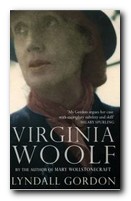a biography as seen through her major works
What does this biography have that the many others don’t? Well, Lyndall Gordon claims that Virginia Woolf a writer’s life was written to counteract the prevailing orthodoxy of Virginia Woolf being depicted as a tormented and unhappy artist – just as she was by Nicole Kidman in The Hours. What Gordon wants to offer as an alternative is a portrait of a sensitive young woman who was provoked into ‘madness’ on three occasions, lived a happily married life, and when she was on top form converted her life experiences into works of experimental fiction.
 The book also has substantial portraits of the other people who were important in her life – her father, Leslie Stephen, her mother Julia Duckworth, and her sister Vanessa Bell. Lyndall Gordon makes no bones about blending factual documentary evidence with fictional constructions, and talking about To the Lighthouse as if it were Woolf’s account of her parents rather than a fictional construct loosely based upon them. And she takes the novels in any order, to suit her purpose.
The book also has substantial portraits of the other people who were important in her life – her father, Leslie Stephen, her mother Julia Duckworth, and her sister Vanessa Bell. Lyndall Gordon makes no bones about blending factual documentary evidence with fictional constructions, and talking about To the Lighthouse as if it were Woolf’s account of her parents rather than a fictional construct loosely based upon them. And she takes the novels in any order, to suit her purpose.
This haphazard approach is quite deliberate and conscious. She defends it as a fresh method: “The way she [VW] experienced life does not accord with the usual kind of linear chronology”. But it is indulged to such an extent that long passages of what purports to be a biographical study are no more than critical commentaries on To the Lighthouse and The Voyage Out after the manner of an undergraduate study guide. This approach reaches its nadir when her reading of The Waves as portraits of Leonard Woolf, Lytton Strachey, and so on lasts for an uninterrupted fifty-two pages, stretching over two chapters.
She focuses strongly on the issue of Woolf’s early mental illness – much of it ascribed to the loss of her mother, and she makes hardly any mention of her attachment to mother-substitutes such as Violet Dickenson.
The lack of chronological rigour and logic has important consequences. In discussing her ‘madness’ for instance, the years 1904, 1915, and 1941 are singled out as the worst – with no cognizance of the fact that they also represent the start of her career as a writer, the date of her first published novel, and the end of her career, when she was writing in the full possession of all her creative powers.
As a writer of literary biographies, Lyndall Gordon is keen to promote the notion that Woolf had similar motivations. She wonders why she is not recognised as a biographer, but looks down her nose at Orlando and Flush, and regards Roger Fry a ‘dutiful’ work – when in fact it is one of the weakest and most superficial of all Woolf’s writing.
Her attitude to Woolf’s intimate life is a combination of coyness and naivety. She skates over the sapphism and imagines that life with Leonard was very romantic, ignoring the fact that she only agreed to marry him in the first place on the understanding that she found him physically repulsive. Yet her account of their early years makes it read as if the sexual content was that of an X-rated B-movie.
When the external evidence piles up to prove that this was not the case, where does she turn for evidence to examine the case further? Well, the fiction of course. So instead of looking at the fairly well documented facts, she presents instead several pages of commentary on Leonard Woolf’s novel The Wise Virgins.
She also shares the naive views expressed by Leonard regarding the randomness of sexual desire – unable to explain why one might be enamoured of a love object whose social and intellectual qualities seem undistinguished. And she doesn’t want to countenance either Vita Sackville-West or the Orlando which was the true consummation of that relationship.
For one thing she can be commended. She has obviously read all the extant drafts of the novels, and offers a reading of them which comments on the changes, deletions, and shifts of emphasis as Woolf worked towards her final versions.
But apart from writing Three Guineas, you would not have a clue about the events of her life in the 1930s – apart from the absurd claim that she was more romantically in love with Leonard than ever.
So, for whom will this book be of any use? Well, it can be ignored as a conventional biography – because you will learn so little about Woolf’s life from it. But it does have critical analyses of her major writings, so it might be helpful to undergraduates or general readers trying to come to terms with some of the highpoints of literary modernism.
© Roy Johnson 2009
Lyndall Gordon, Virginia Woolf: A Writer’s Life, London: Virago, rev edn 2006, pp.431, ISBN 1844081427
More on Virginia Woolf
Virginia Woolf – web links
Virginia Woolf – greatest works
Virginia Woolf – criticism
More on the Bloomsbury Group